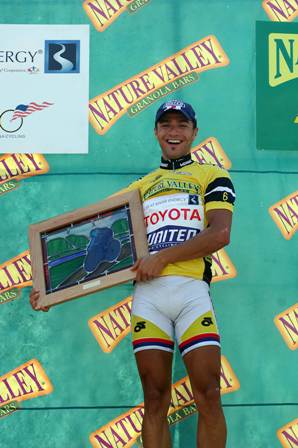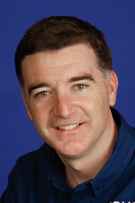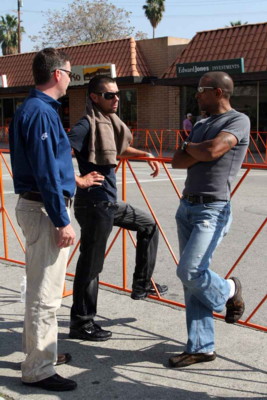|

29.06.2007/ Last year we spoke with Toyota-United team owner Sean P. Tucker about the first season
of the team and about the unique team structure. Sean P. Tucker has a very different approach than most other team owners
have. Could Toyota-United become a role model for pro cycling in the future?

|
| Last week Toyota United's Ivan Stevic won the Nature Valley GP overall (picture: Matthew Moses) |
More pictures at our Picture Gallery: Toyota-United rocks!
Cyclingheroes: European pro cycling is in big trouble The power struggle between the organizers of the grand Tours and the UCI and
the doping issue: TV ratings are dropping, some sponsors are leaving the sport. Do you have an idea how the sport could solve
these problems?
Sean P. Tucker: All good questions. Let me first address the doping issue, as I have some very strong feelings about that topic.
The dynamics in European bicycle racing are structured to open the door to doping for two main reasons: First, the riders
are doing these long, two- and three-week stage races and they are doing a lot of racing throughout the season. Second, if
they do well in these big races, they can make a million or more dollars in salary and endorsements per year for years after
that. So the way cycling in Europe is structured, with the length of the tours and the number of races throughout the season,
if you do well, you can set yourself up pretty well for retirement. That’s the preface for my response.
So there
are really, logically, only two ways to fix the problem of doping. You either have to change the system [i.e. shorten the
tours and/or the number of races they do throughout the year] which for me, personally, is not very attractive. Or the other
thing you do is an idea I have had for years – which borrows from a policy that is in place in the software industry.
In the
software business, when a company licenses software from another company, they typically request that a copy of the software
code is deposited with an independent software code escrow company. So if the company that created the program ever goes bankrupt,
all the licensees have access to the source code in order to be able to continue to use the program and maintain it for future
use. This concept was used heavily during the Internet dot-com days from 1995 – 2000 when a lot of start-up companies
had innovative technologies but not a lot of funding/customers so licensees had to protect themselves.
The
UCI can do something similar by putting a large portion of each rider’s salary into an escrow account with an independent
company. From there, each rider would get a base percentage of their annual pay. Riders who are only making $100,000 might
get as much as 50 percent. The ones making in the millions would only get 5 or 10 percent. So whether you are on the low or
high end of the pay scale, the idea is to let the rider maintain a respectable lifestyle. The rest of a rider’s salary
goes into an account that and independent escrow company controls for 12-18 months.
The
idea is that if a rider tests positive over the duration of a rolling 12 month window while under contract, he would forfeit
the unpaid balance of his salary. The money would instead go toward a foundation created to further research doping and its
psychological effects on cyclists. This foundation would also offer a rehabilitation center where riders who are caught doping
– whether they are a rookie or a 10-year veteran – would be educated on why they should not dope and how harmful
it can be to their physical and mental health. One of the goals would be to provide a long-term solution to the question of
“why” cyclists are tempted into this form of cheating. If a rider does not have a positive test at anytime during
the season, they receive the balance of what they are owed, plus a modest interest rate of say five percent or the current
going rate.
As for
the issue of the UCI getting along with the organizers of the big tours, I think there needs to be some give and take. Both
parties don’t seem to want to bend. I think there should be more teams in these races. The major ProTour stage races
should get to have their 20 teams. But instead of having nine riders per team, allow only seven or eight. That will free up
spots for a few more teams. Or simply increase the number of riders who are allowed to compete in the event and invite more
teams from the country the tour is in.

|
| Sean P. Tucker (picture: Toyota-United) |
Cyclingheroes: Are these problems having an effect on cycling in the US?
Sean P. Tucker: Predominantly, in terms of guys using performance enhancers, we
don’t have the problem here in the United States because the system isn’t set up to reward that behavior like
it does in Europe. We don’t have the big paydays, the large number of races or the long, two-and-three-week stage races
I referred to earlier. Even if a guy won every single race in America, no team has a budget to pay him more than low six figures
a year in salary.
Cyclingheroes: Do you think it’s possible that the tremendous
pressure for teams and athletes who are depending on one title sponsor and therefore often have to fight for a new sponsor
contract every year could be one of the reasons for riders to take performance enhancing drugs?
Sean P. Tucker: Again, I would have to say the primary reason cyclists turn to doping
is because of the way the system is set up. As for fighting for sponsors, I cannot speak for other teams, but I know that
our title sponsor, Toyota, is a deal based on simply attending the races and doing our best. We have not guaranteed them a
single win. But if there are teams that have done that, then the answer might be “yes” about half the time.

|
| Sean P. Tucker talking with Caleb Manion and Ivan Dominguez (picture: Kathleen Poulos) |
Cyclingheroes: Johan Bruyneel said in an interview with Dutch newspaper
"De Volkskrant" that one of the problems of cycling is that most European teams have a weak financial structure. They are
all depending on one title sponsor; Toyota-United has a different concept. Can you tell us more about that?
Sean P. Tucker: I
approached this team with a business mindset first and a passion for racing second. We wanted an alternative to the current
model where X, Y and Z team is supported by a company and when that company decides that they're done with that team, the
team is done. My model marked a monumental change for the industry. It is structured in a manner similar to the fan-inclusive
models of NASCAR and Formula 1 where each team is its own individual brand, supported by a strong corporate partner.
Since cycling does not have gate revenues or
ticket revenues – and the teams don’t share in TV revenues – and the name of the team is generally
the title sponsor, it creates fundamental problems for a revenue stream that supports the brand. We’re trying to change
that by having multiple revenue streams in the form of annual memberships, merchandise sales, sponsorships, license revenues
on our bike company United Bicycles, etc.
Plus, when you look
at baseball, football and most other sports, fans support the sport. It all starts with the fans when it comes to merchandise
sales, TV revenue or gate revenue. And cyclists are the most die-hard fans of any sport. So we wanted to give them a way to
be part of the team and contribute to it. Our fan club membership now boasts more than 20,000 members. So we’re focusing
on the things we can control: the name of the team, selling annual memberships to fans to help fund the team and we are also
working on deals related to TV distribution on the domestic scene.
Cyclingheroes: Do you think it’s possible to make the team even more independent
from sponsors in the future?
Sean P.
Tucker: Yes,
by achieving the goals set out above. However, it’s important to note that we need and want sponsors like Toyota. However,
by us creating franchise cycling teams and more overall value, it only helps the value proposition for name and title sponsors
for companies like Toyota. Basically we see two sponsor options: Either be the name of the team and be a big fish in a small
pond; or be part of a larger vision like Toyota-United and increase the size of the pie that reaches more people on a broader
scale and be a name-in-title sponsor like Toyota has done. Toyota-United Pro Cycling Team.
Cyclingheroes: Are you still planning to get a Pro-Continental
status for Toyota-United in 2008?
Sean P.
Tucker: Yes.
We will be 100 percent Pro-Continental in 2008 unless the Continental Team rules change and are favorable to us in some way.
Cyclingheroes: Would a Pro-Continental status have an effect on the way
the team is financed?
Sean P.
Tucker: No.
Cyclingheroes: Do you get reactions from other pro teams about the Toyota-United
business model?
Sean P. Tucker: Yes. They like it. And they wish their team was that way.
Cyclingheroes: In Germany there is a team, FC Rheinland-Pfalz, which is financed like a European
soccer team. They don't have a title sponsor but a pool of smaller sponsors. Do you think that Toyota's hybrid business model
and the way FC Rheinland is financed are important developments for pro cycling?
Sean P. Tucker: The way our business model is financed
– which is through sponsorships such as Toyota – and fan club memberships, merchandise sales, bike sales and private
investors – is a more complete business model than the one you mention. I believe it is critical that you rely on multiple
revenue streams beyond sponsors whether it is one large one or several small ones.
Cyclingheroes: Are you satisfied with the way the team developed in the last 18
months?
Sean P. Tucker: Yes. In 2006, we
won a total of 55 races – which amounted to 50 percent of the races we entered. We are the only domestic team to win
stages at the Tour de Georgia and the Amgen Tour of California. Our fan club membership numbers more than 20,000 and last
year we sold 600 jerseys. We have also licensed our bike United Bicycles to the parent company of Fuji Bicycles and they are
out marketing and trying to gain distribution for us.
Cyclingheroes: In about a week the Tour de France will start,
is it possible that we see the colors of Toyota-United at the Tour someday?
Sean
P. Tucker: Clearly,
the Tour de France is our sport’s biggest spectacle. Our goal right now is to exclusively focus on becoming the most
consistent and most dominating team in the U.S. Right now we are not even looking at the Tour, although we want to someday
be a part of the sport’s biggest spectacle. We feel that cycling has to clean up the doping issues and create a structure
where riders are not tempted to dope and one where they are proportionately punished for doping offenses. When the sport cleans
these issues up, we’ll take a hard look at it.
|

